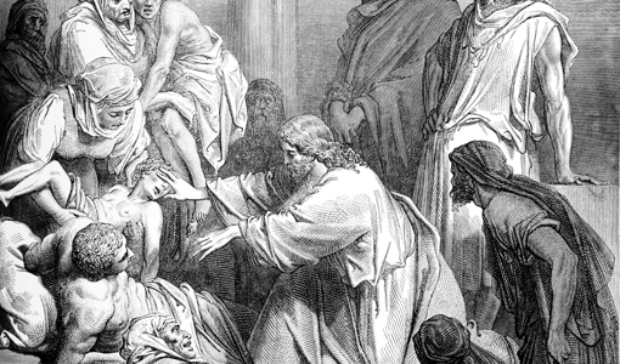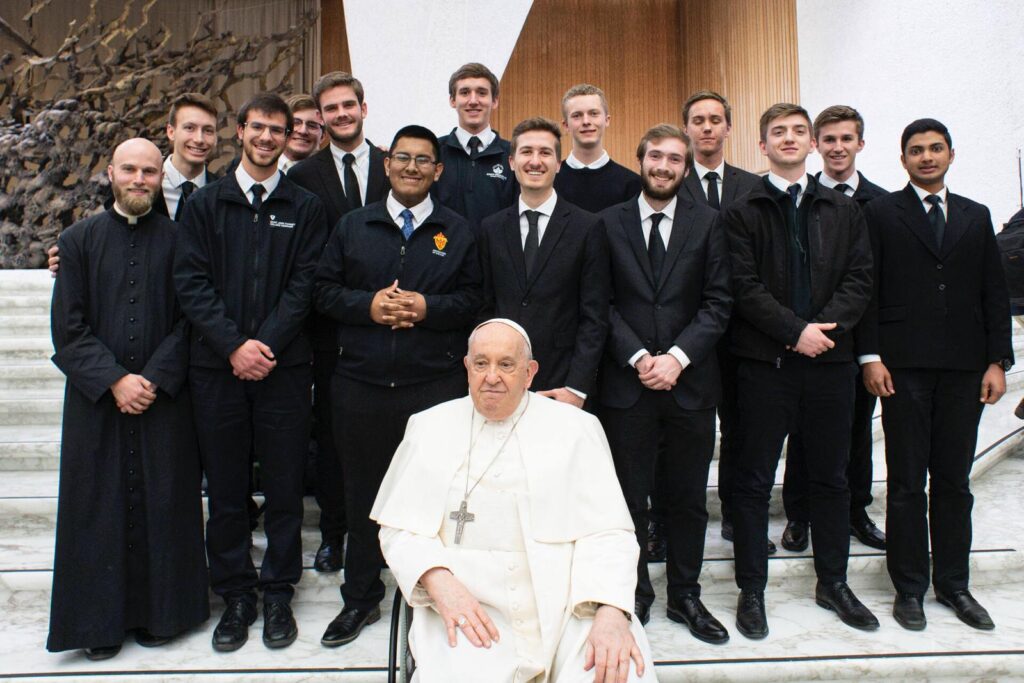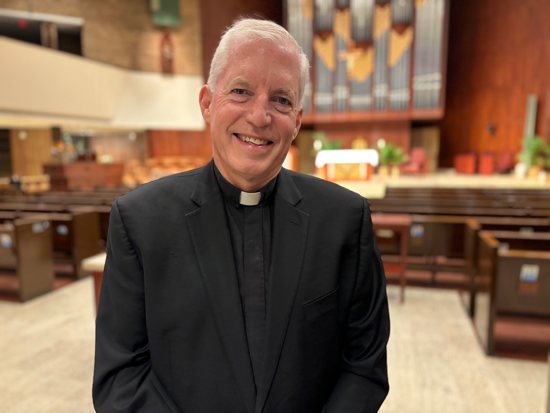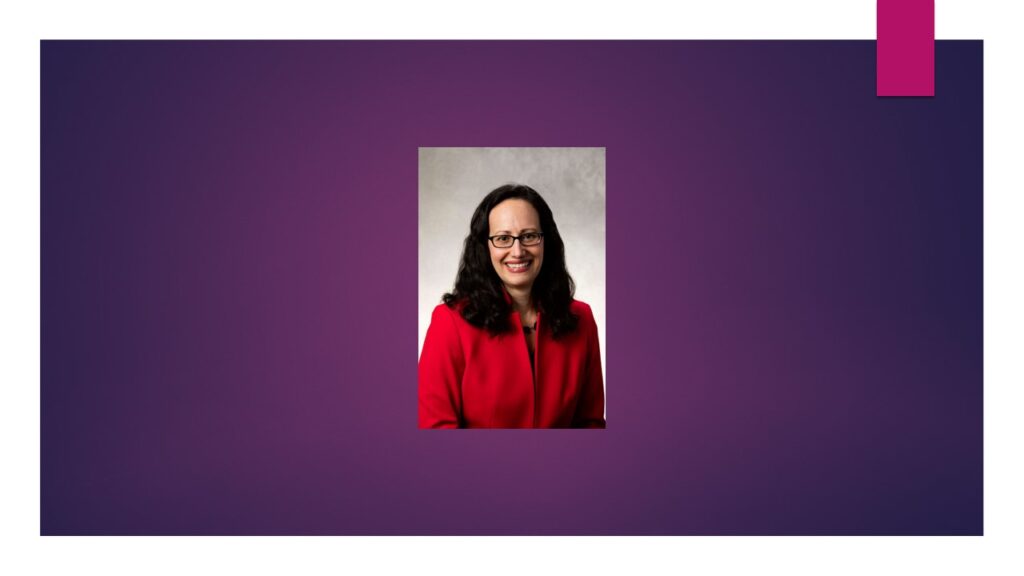As a part of their ongoing “Higher Calling” series, the John A. Ryan Institute for Catholic Social Thought and the Joseph and Edith Habiger Institute for Catholic Leadership, in association with the SAIP Institute of the Opus College of Business, sponsored William Brinkmann for a presentation and panel discussion titled, “The Higher Calling Series: Maintaining a Catholic Identity in a Secular World.” Nearly 40 professors, students and business health care professionals gathered on September 27 on the Minneapolis campus to discuss Catholic identity in health care. The following day, Brinkmann spoke to Catholic Studies students on the different vocations needed in Catholic health care and the necessity for students to see their vocational calling manifested in the Catholic health care world.
In his Minneapolis presentation to professionals, Brinkmann, vice president of formation for Ascension Health, the largest Catholic and nonprofit health care system in the United States, discussed the challenge of maintaining and renewing Catholic identity in healthcare. He stated that the way Ascension Health speaks of its call and identity is framed upon the idea of ministry. “We are first and foremost a ministry of the Church, continuing the healing mission of Jesus. Our strategic direction is the way we live our mission. This understanding is the basis of all that we do.” He spoke about the praxis of that mission in outlining the various formative programs required of Ascension Health care upper management professionals. Effective formation, he said, “is a transformative process rooted in theology and spirituality which connects us more deeply with God, creation and others. Through self-reflection it opens us to God’s action so that we derive meaning from the work we do, grow in awareness of our gifts, see our work as vocation, and build a communal commitment to the ministry of healthcare.”
The reason behind formation of the executive level alone is not to promote mission-centered policies which “trickle down” the corporate hierarchy. Rather, Brinkmann noted, spiritual formation ideas, creativity and meaningful processes tend to have their genesis in the width and depth of those in the front lines of medical care. In order for those new ideas to take shape into policy, upper management must be in line with the Catholic mission of the organization. In this way, policy changes that promote Catholic identity and mission are more likely to succeed.
It is not only executives who need formation, according to Brinkmann. The corporate entity as a whole also needs to be reminded of its Catholic identity and formed to its principles. The Catholic Identity Matrix (CIM) is a tool which helps an organization assess and enhance the extent to which its conduct for the organization is shaped by standards like solidarity with the poor, respect for human life and dignity, holistic care and acting in communion with the Church. The outputs of the assessment allow leaders to see how well such principles have been embedded in their organization’s operations and to identify needed improvements. The CIM helps a Catholic hospital foster a community of engaged, capable and inspired people and sustain a culture that is mission-focused and deeply rooted in its identity as a Catholic institution.
Accompanying Brinkmann in the discussion of Catholic identity in health care was Kenneth Goodpaster, David and Barbara Koch Chair in Business Ethics at the Opus College of Business; T. Dean Maines, president of the SAIP Institute; and Michael Naughton, Moss Chair in Catholic Social Thought and director of the John A. Ryan Institute for Catholic Social Thought. In addition, Sister Mary Eliot Crowley, administrator for Franciscan Sponsorship at Saint Marys Hospital, a part of Mayo Clinic in Rochester, Minn., presented her experiences and perspective on maintaining a Catholic identity within a secular health care system. She noted that physicians working for Saint Marys are salaried; they do not receive additional monetary gain for patients seen, tests ordered or procedures given. They participate in the healing mission of Jesus and receive a just wage, not one of exorbitant excess. “Nineteen hundred doctors seem to find it a wonderful arrangement and experience,” she added. Sister Crowley agreed with Brinkmann’s assessment that secularism has been an unqualified failure, and that employees in health care – and the general population – are seeking a holistic method of work and life, in addition to their care of patients. (See Faith and Work article on p.33.)
To Catholic Studies students, Brinkmann spoke to the need of committed Catholics to apply for positions in Catholic health care, whether in finance, administrative support, supplyline or other entry-level positions, in addition to the traditional role of physicians and nurses. He noted that their Catholic intellectual formation as Catholic Studies majors and minors would make them desirable to an organization such as Ascension Health, and added, “Ascension Health wants committed Catholics throughout our organization. We’re implementing a hiring policy that will hire to mission, although each hospital/clinic has its own independence in hiring based on the unique characteristics and skills needed. I would encourage everyone to consider vocation to Catholic health care.”
The Catholic Identity Matrix (CIM) – The CIM is an organizational assessment and improvement process designed for Catholic healthcare institutions. Utilizing the assessment approach pioneered by the Malcom Baldridge National Quality Program, the CIM helps these institutions evaluate the degree to which their current policies and processes are consistent with ethical aspirations of the Catholic moral tradition. By identifying gaps between the requirements of these principles and current practices, the CIM enables an organization to modify its operations in a way that better aligns behavior with important ethical values. Over time, systematic application of the CIM allows a Catholic health care institution to strengthen its identity as a Catholic ministry. The CIM is the product of collaboration between Ascension Health and the SAIP Institute, with support from the University of St. Thomas’ John A. Ryan Institute for Catholic Social Thought.
Read more from Perspectives







